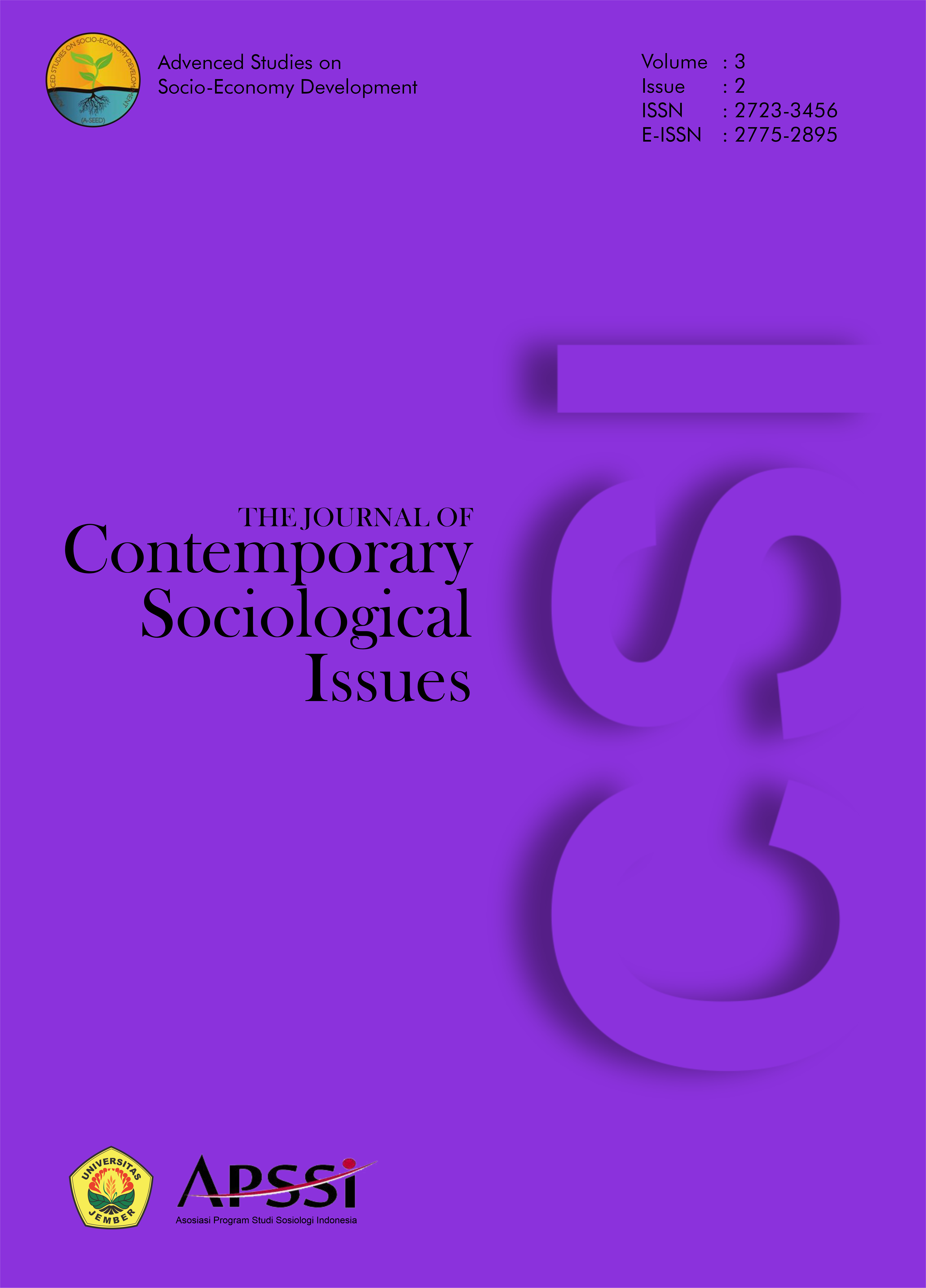The Xenophobic Attacks on African Immigrants
The conflict profile in the South Africa Case
DOI:
https://doi.org/10.19184/csi.v3i2.25327Keywords:
Xenophobia, xenophobic conflict, hatred speech, economic tension, South Africa.Abstract
Since the country's xenophobic violence in 2008, the 2019 xenophobic assaults are a new reminder of South Africa's anti-immigrant prejudice. Xenophobia threatens refugees, asylum seekers, economic migrants, and other designated geographical "outsiders," including internal migrants and minority ethnic groups. This study will provide an overview of xenophobia in South Africa and insights into its occurrence by examining the conflict profile, including the background, actors, causes, and the present dynamic of the conflict. In this qualitative study, the exploratory analysis concentrates on a thorough examination of available secondary data. Issues regarding economic tensions, hatred, and hate speech surfaced as a reality of conflict. The Generalized Deterrence Theory (GDT) will support this research and explain why certain people behave criminally, oddly, or anti-socially. Thus, this study argues that measuring economic improvement and improving land policy is a potential treatment for xenophobia. Until the problems of unemployment and poverty are resolved, xenophobia will decrease proportionately. Nevertheless, political games, which tend to take the form of hate speech, have proven to impact disputes and should be avoided.
Keywords: Xenophobia, Conflict, hate speech, economic tension, South Africa
Downloads
References
Claassen, Christopher. ‘Explaining South African Xenophobia’. SSRN Electronic Journal, no. 173 (2017). https://doi.org/10.2139/ssrn.2974065.
Durban Declaration, United Nations, General Assembly, Concept Note, Racial Discrimination, South Africa, Member States, and The Durban Declaration. ‘High-Level Meeting to Commemorate the Twentieth Anniversary of the Adoption of the Durban Declaration and Programme of Action : “ Reparations , Racial Justice and Equality for People of African Descent â€â€™, no. September (2021): 1–4.
Fayomi, Oluyemi, Felix Chidozie, and Charles Ayo. ‘A Retrospective Study of the Effects of Xenophobia on South Africa-Nigeria Relations’, 2004.
Hennebry, Jenna, and Hari KC. ‘Quarantined! Xenophobia and Migrant Workers during the COVID-19 Pandemic’, 2020, 1–12.
Horwood, Christopher. ‘Smuggled South’, no. March (2017).
‘Identity and Migration Studies’. Sociology The Journal Of The British Sociological Association 2, no. 2 (2008).
Ilesanmi, OO. ‘Xenophobic Attacks And Other Violence In South Africa: A Challenge To World Peace’. IFE PsychologIA 16, no. 3 (2008). https://doi.org/10.4314/ifep.v16i3.23793.
Isilow, Hassan. ‘Refugees in South Africa Still Live in Fear of Xenophobic Attacks’, 2021. https://www.aa.com.tr/en/life/refugees-in-south-africa-still-live-in-fear-of-xenophobic-attacks/2280537.
Khumalo, Thuso. ‘Stubborn Xenophobia in South African Society’. DW, 18 August 2022. https://www.dw.com/en/the-stubborn-xenophobia-in-south-african-society/a-62809345.
Landau, L., B. 2004. Urbanization, Nationalism and the Rule of Law in South Africa's Forbidden Cities, written submission from Forced Migration Studies Programme, University of Witwatersrand.
Landau, L, B. and Jacobson, K . 2004. "Refugees in the New Johannesburg" in Forced Migration Review. Vol 19:44-46. 1.
Lehlohonolo, Mojalefa, and Johannes Koenane. ‘Xenophobic Attacks in South Africa : An Ethical Response - Have We Lost the Xenophobic Attacks in South Africa : An Ethical Response – Have We Lost the Underlying Spirit of Ubuntu ?’, no. September 2013 (2015).
Lesetedi, Gwen N, and Tirelo Modie-Moroka. ‘Reverse Xenophobia: Immigrants’ Attitudes Towards Citizens in Botswana’. African Migrations Workshop: Understanding Migration Dynamics in the Continent, no. 267 (2007): September 18-21, 2007.
Misago, Jean Pierre, Iriann Freemantle, and Loren B Landau. ‘Protection from Xenophobia: An Evaluation of UNHCR’s Regional Office for Southern Africa’s Xenophobia Related Programmes’. UNHCR, 2015.
Mulaudzi, Godfrey, Lizette Lancaster, and Gabriel Hertis. ‘Busting South Africa’s Xenophobic Myths Starts at Grassroots’. ISS Africa, 12 April 2021. https://issafrica.org/iss-today/busting-south-africas-xenophobic-myths-starts-at-grassroots.
Newham, Gareth. ‘Do Foreigners Really Commit SA’s Most Violent Crimes?’ ISS Africa, 29 November 2017. https://issafrica.org/iss-today/do-foreigners-really-commit-sas-most-violent-crimes.
Nshimbi, Christopher Changwe, and Lorenzo Fioramonti. ‘The Will to Integrate: South Africa’s Responses to Regional Migration from the SADC Region’. African Development Review 26, no. S1 (2014): 52–63. https://doi.org/10.1111/1467-8268.12092.
Ogunnoiki, Adeleke Olumide. ‘Xenophobic Violence in South Africa and the Reactions in Nigeria’. Covenant University Journal of Politics & Internationall Affair 7, no. 2 (2019).
Parliament of the Republic of South Africa. (2008). Report of the task team of members of Parliament probing violence and attacks on foreign nationals.
South African Human Rights Commission. (2010). Report on the SAHRC investigation into issues of the rule of law, justice and impunity arising out of the 2008 public violence against nonnationals.
Steinberg, J. (2008). South Africa's xenophobic eruption. Institute for Security Studies Paper 169. Institute for Security Studies, Johannesburg.
Trading Economics. ‘South Africa Unemployment Rate | 2021 Data | 2022 Forecast | 2000-2020 Historical’, 2021. https://tradingeconomics.com/south-africa/unemployment-rate.
United Nations Human Rights. ‘When Does Xenophobia Increase?’, no. September (2013): 1–2.
UN News. ‘South Africa “on the Precipice of Explosive Xenophobic Violenceâ€, UN Experts Warn’, 2022. https://news.un.org/en/story/2022/07/1122612.
Downloads
Published
Issue
Section
License
Copyright (c) 2023 Emmanuel Micheal Massay, Novri Susan

This work is licensed under a Creative Commons Attribution-NonCommercial-ShareAlike 4.0 International License.








